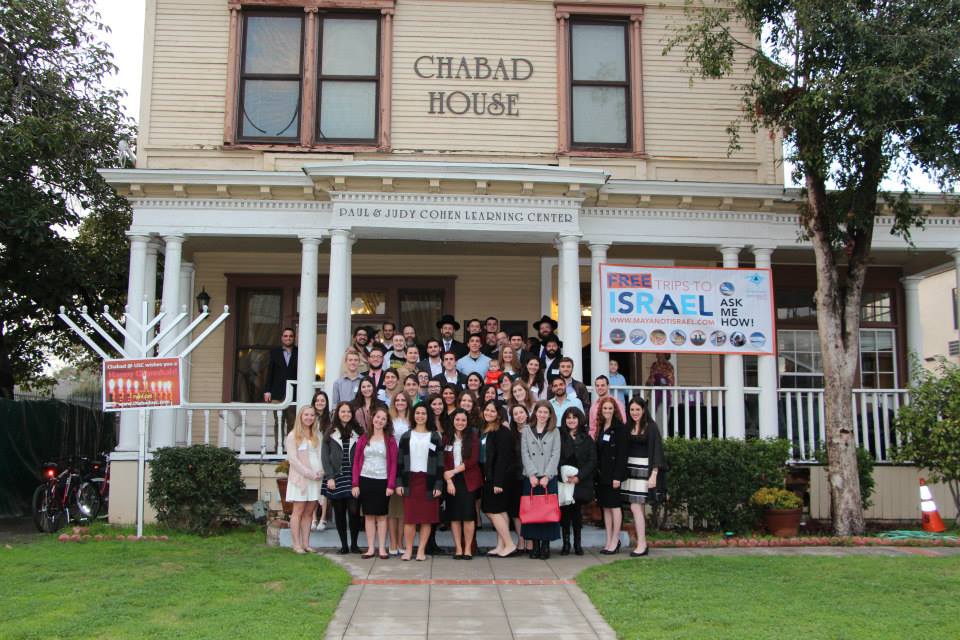This past Sunday afternoon, current students and alumni of UCLA, USC, CSUN, and SMC gathered to ask questions about American Jewry and the State of Israel to Rabbi David Baruch Lau, the Ashkenazi chief rabbi of Israel, during his first trip to the West Coast.
Chabad at USC hosted the event, modeled as a town hall meeting, during which students could engage in a Q&A; with the rabbi. According to the Facebook event page, it was meant to be a “frank and open conversation.” However, it felt much less candid than promised.
Rabbi Lau’s opening speech emphasized the importance of Jewish identity and the integral role coming generations play in its growth and development. His overarching theme was that Judaism rests in the hands of both the older and the younger generations, for the former provides tradition and roots, while the latter controls Judaism’s trajectory. “We need to check ourselves,” Rabbi Lau explained, paraphrasing the Talmudic sage Akavya ben Mehalalel from Pirkei Avot, or Ethics of the Fathers, in order to “know where [we] came from and where [we] are going.”
He then made an interesting observation: The majority of our generation is proud to be the grandchildren of our grandparents, but will our grandchildren be proud of us as their grandparents? He defined Judaism as a chain, in which each link plays a fundamental role. It was unclear whether the links represent individuals, generations or both, but it was clear that Rabbi Lau expects a lot from our generation — perhaps more than what we are currently delivering.
At this point, he opened the floor to student questions. One student asked about the best approach to Israel advocacy on campus: religiously? Culturally? Politically? Rabbi Lau articulately responded that students needed to represent and advocate for Israel. However, underneath the rabbi’s eloquent response, there was little substance.
In his heavily-accented English, Rabbi Lau managed to maintain a surprising element of political correctness. This was exemplified in his answer to the question of whether President Obama is a friend or foe of Israel: “Friend. The real question is whether he could be more or less friendly, but that is political and I don’t do political.” With this question as well as others, he avoided a nuanced approach in delivering his responses.
Several questions addressed his reaction to the recent Paris attacks and rising European anti-Semitism. Although Rabbi Lau claimed to have no concrete explanation for the increase in European anti-Semitism, he did say the following: “Enemies try to find themselves a place [in this world], and our [Jewish] tradition disrupts them [from doing so] because our religion is one that calls [us] to respect all creations of G-d.”
Despite the poeticism of his answer, he did not expand on who exactly these enemies are (Muslim extremists? Secular anti-Semites?), nor how to combat them.
Overall, Rabbi Lau seemed less concerned with external players in anti-Semitism than with the Jewish people themselves. While maintaining Judaism’s strength from the inside out is essential to the preservation of Jewish customs and religion, it is a bit idealistic to disregard the very realistic threat of external forces. Understandably, Rabbi Lau is a religious figure, not a political one; nevertheless, his personal opinions on the matter would have been more appreciated than the vague and sugar-coated answers he delivered.
In terms of the best way to deal with this rise of anti-Semitism, he avoided directly answering the question, perhaps because the question is admittedly unanswerable. He acknowledged the richness of Jewish history in Europe, but he did not shed insight as to whether he believed there was merit in trying to combat anti-Semitism, or if aliyah, immigration to Israel, is the only option. He did echo Israeli Prime Minister Netanyahu’s sentiments that Israel can and would openly admit France’s 600,000 Jews into its borders, but again, he left his opinions out of the matter: his statement was a fact, not an insightful new perspective on the issue. Upon further questioning, Rabbi Lau expressed that the best way to keep Jewish tradition is for all Jews to concentrate in one location: Israel. But again, this answer was not a clear declaration encouraging French aliyah.
In terms of securing the Israeli people, Rabbi Lau addressed the issue of the ultra-Orthodox exemption from serving in the Israeli Defense Forces. Rabbi Lau himself served as a major in the Intelligence Corps of the IDF. He clarified that he joined after his studies, stressing the importance of learning the Judaic roots of the land of Israel. He attributed this scholarly connection to the State as the reason for why the Jewish homeland is where it is, as opposed to Uganda, for example, which was Theodor Herzl’s country of choice. “We must use everyone’s talent in the right avenues,” Rabbi Lau elucidated. “We need the best sages in our traditions,” not necessarily in the army.
Rabbi Lau is an erudite and venerated leader in the Jewish community. His charm and wit translated in the short two hours of the event. However, there was a certain lack of depth that undermined the frankness and openness promised. He appeared to establish boundaries for himself before the event, which he would adamantly stay within as the event progressed. Perhaps the language barrier hindered the scope of his answers. Perhaps a room full of American students made him weary of political incorrectness. Nevertheless, even if Rabbi Lau did not spell out word-for-word how our generation can strengthen our link in the Jewish chain, he reminded us that we each play an integral role within it.

